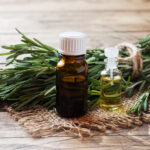Transform your skin and hair with this fragrant herbal oil
 (NaturalHealth365) With its hearty flavor and clean, distinctive scent, rosemary holds a place of honor as an important seasoning in the (supremely healthy) Mediterranean diet. In fact, rosemary and rosemary essential oil have been used in traditional folk medicine for centuries to soothe digestive complaints, support healthy blood sugars, reduce inflammation, and enhance mood.
(NaturalHealth365) With its hearty flavor and clean, distinctive scent, rosemary holds a place of honor as an important seasoning in the (supremely healthy) Mediterranean diet. In fact, rosemary and rosemary essential oil have been used in traditional folk medicine for centuries to soothe digestive complaints, support healthy blood sugars, reduce inflammation, and enhance mood.
In addition, as if delivering culinary and therapeutic benefits weren’t impressive enough, rosemary is currently receiving “props” for its cosmetic value and its evidence-based ability to promote the health and appearance of skin and hair. In a 2020 review, the authors credited rosmarinic acid – a compound found in rosemary – with anti-inflammatory, antioxidant, astringent (skin-toning), and antibacterial effects. So let’s see how these properties allow rosemary to support healthy, glowing skin and thicker, shinier hair.
Rosemary essential oil can cleanse, tighten and protect your skin
Thanks to its rosmarinic and carnosic acids, rosemary oil has potent antioxidant effects, allowing it to scavenge free radicals and help prevent photoaging (in other words: wrinkles) resulting from exposure to UV rays in sunlight. In addition, rosemary’s mild exfoliant and astringent qualities can help clear and tighten skin, while its anti-inflammatory properties help diminish skin irritation and swelling.
As a natural microbial agent, rosemary excels at gently cleansing the face and may help combat breakouts and blackheads. According to a review in the Journal of Medicinal Foods, rosemary extract combats the pathogen implicated in acne – a nasty little “bug” known as Propionibacterium acnes. (Convenient, right?)
Speaking of convenience, it’s easy to access rosemary’s benefits for the skin. Simply combine a half cup of distilled water, a teaspoon of vegetable glycerin, and five to six drops of rosemary essential oil. Shake well, then dab or spray on the desired areas, carefully avoiding the eyes. If whipping up your homemade herbal potion isn’t your “thing,” look for a high-quality commercial cream or lotion containing rosemary (botanically known as Rosmarinus Officinalis).
By the way, some integrative healthcare professionals advise rosemary essential oil to ease the itchiness and swelling that accompanies eczema, dermatitis, and minor insect bites. Dilute five or six drops of rosemary essential in a teaspoon of olive, avocado, or jojoba oil, then apply to affected areas.
In a “head-to-head” trial, rosemary essential oil outperformed a prescription hair regrowth drug
According to experts at the Cleveland Clinic, male pattern baldness (MPB), one of the most common reasons for hair loss, affects two-thirds of all adult men. (Women – who can experience female pattern baldness – don’t exactly get off scot-free either). But there’s good news.
In a controlled clinical study involving participants with MPB, diluted rosemary oil was massaged into the scalp twice a day for six months. When it came to stimulating hair regrowth and increasing hair thickness, rosemary oil outperformed minoxidil (Rogaine) – a prescription medication considered the “gold standard” for hair regrowth remedies.
Rosemary oil may also combat a type of “patchy” hair loss known as alopecia areata. In one encouraging placebo-controlled study, almost half of the rosemary oil group showed improvement in hair loss, compared to only 15 percent in the control group. If your once-luxurious locks are thinning, massaging your scalp with rosemary oil may be a wise move.
Rosemary reduces brittle hair and curbs breakage
In addition to its hair-thickening effects, rosemary is believed to add moisture and elasticity to damaged tresses – which may result in a shinier, healthier head of hair. For an overnight hair conditioning treatment that “means business,” combine a tablespoon of rosemary oil with two tablespoons of olive oil.
Massage the solution thoroughly into the hair and scalp and leave it on overnight. (You may want to protect pillowcases and bedding with a towel). Then, cleanse your hair in the morning with a mild shampoo. Natural beauty experts often advise this natural deep-conditioning treatment for restoring luster to dull or damaged hair.
Rosemary is a natural stress-buster
You may be able to soothe jangled nerves and ease anxiety by using rosemary essential oil in an aromatherapy diffuser. Studies have shown that smelling the scent of rosemary slows the pulse and reduces salivary levels of cortisol, also known as the “stress hormone.” In addition, rosemary is believed to have mild antidepressant properties, allowing it to promote a calm, positive mood.
If you don’t have a diffuser, you can place a few drops on a napkin and sniff it at intervals.
While the herb known as rosemary is considered generally safe when taken in amounts normally found in foods, rosemary essential oil is much more concentrated and should never be taken internally. Rosemary oil may, however, be used in a diffuser and can be applied to the skin after being diluted with carrier oil. Before trying rosemary essential oil or extracts, check with your experienced integrative healthcare provider or health coach.
Bottom line, as recent research shows, rosemary – along with rosemary essential oil – is clearly a “rising star” in the world of natural beauty.
Sources for this article include:
EMediHealth.com
Healthline.com
NIH.gov
NIH.gov
NIH.gov
ClevelandClinic.org



